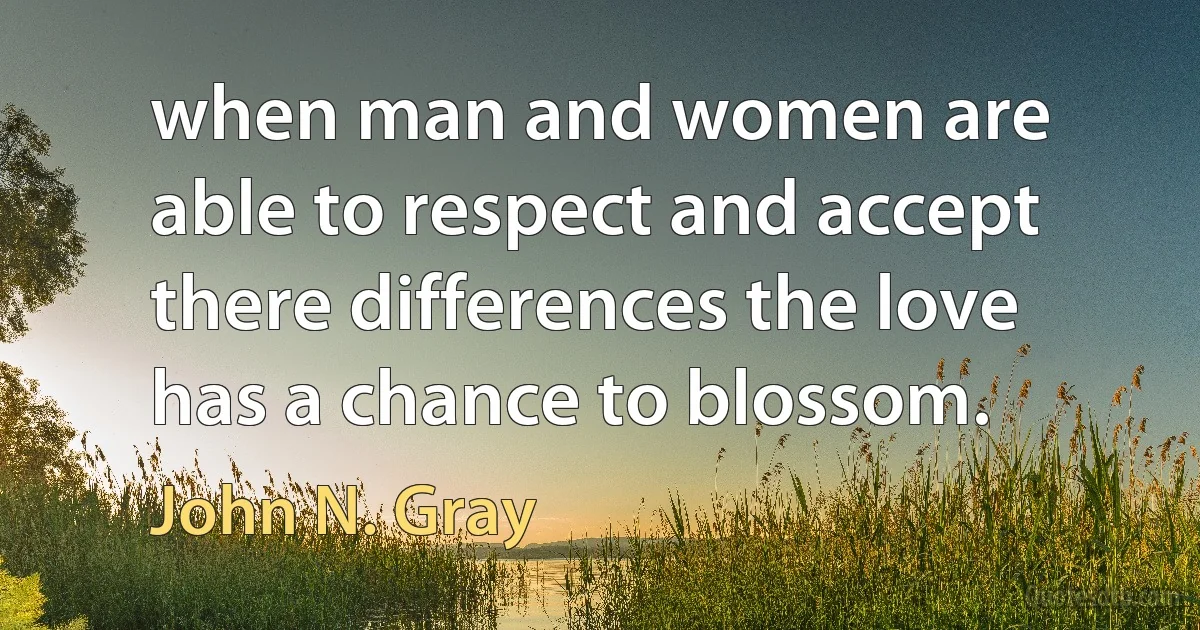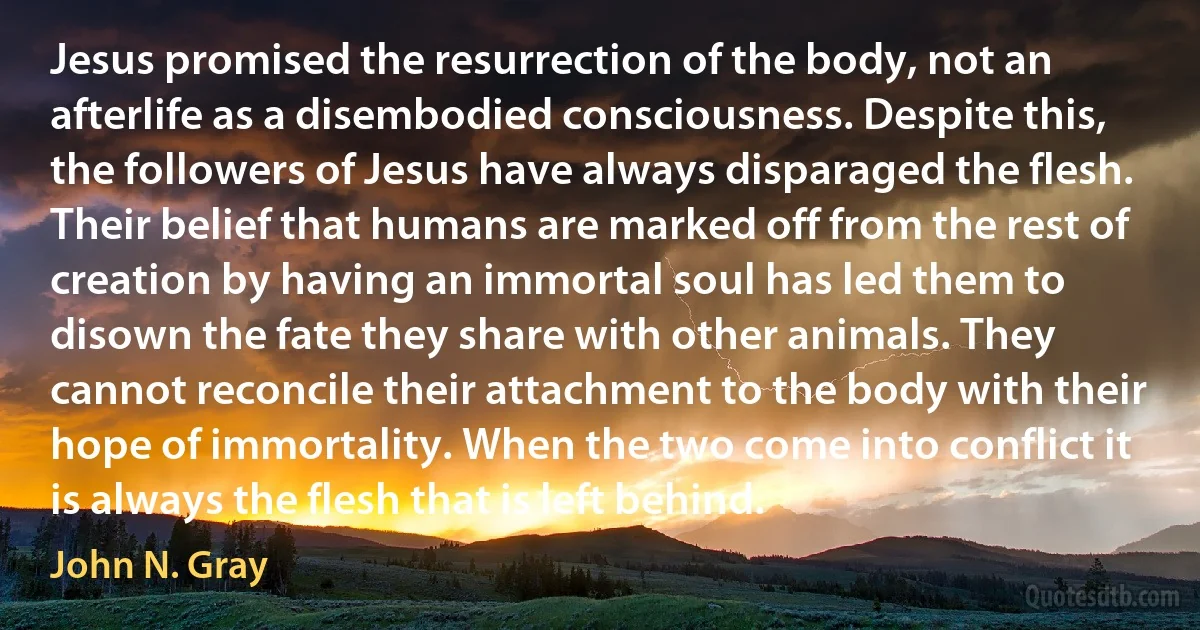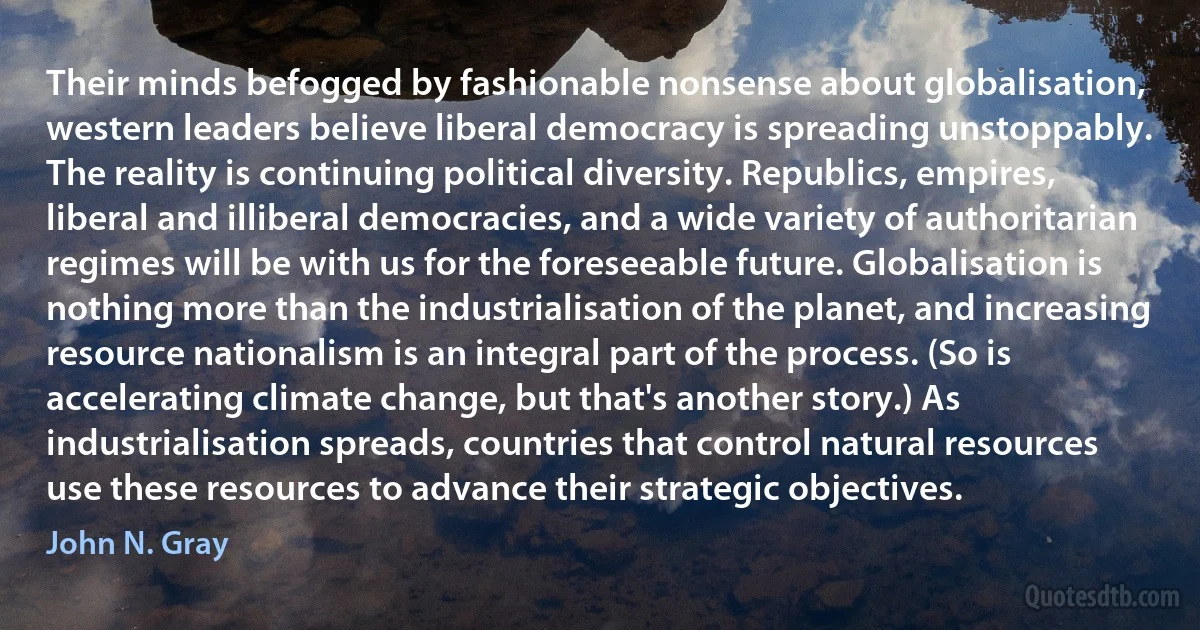John N. Gray quotes
John N. Gray is a British philosopher and author, widely known for his critiques of liberalism and humanism. His works address topics such as political philosophy, the limits of progress, and the complexities of human nature. He has profoundly influenced contemporary debates on politics, ethics, and society. Here are 159 of his quotes:
Our lives are more like fragmentary dreams than the enactments of conscious selves. We control very little of what we most care about; many of our most fateful decisions are made unbeknownst to ourselves. Yet we insist that mankind can achieve what we cannot: conscious mastery of its existence. This is the creed of those who have given up an irrational belief in God for an irrational faith in mankind.

John N. Gray
Christianity struck at the root of pagan tolerance of illusion. In claiming that there is only one true faith, it gave truth a supreme value it had not had before. It also made disbelief in the divine possible for the first time. The long-delayed consequence of Christian faith was an idolatry of truth that found its most complete expression in atheism. If we live in a world without gods, we have Christianity to thank for it.

John N. Gray
For Leopardi evil is integral to the way the world works; but when he talks of evil he does not mean any kind of malign agency of the sort that Gnostics imagined. Evil is the suffering that is built into the scheme of things. ‘What hope is there when evil is ordinary?' he asks. ‘I mean, in an order where evil is necessary?' These rhetorical questions show why Leopardi had no interest in projects of revolution and reform. No type of human action – least of all the harlequinade of politics – could fundamentally alter a world in which evil was ordinary.

John N. Gray
Might there not be a connection between the attempt to eradicate religion and the loss of freedom? It is unlikely that Mao, who launched his assault on the people and culture of Tibet with the slogan "Religion is poison," would have agreed that his atheist world-view had no bearing on his policies.

John N. Gray
Contemporary liberals think of rights as universal human attributes that can be respected anywhere, but here they show a characteristic disregard of history. Current understandings of human rights developed along with the modern nation-state. It was the nation-state that emancipated individuals from the communal ties of medieval times and created freedom as it has come to be known in the modern world. This was not done without enormous conflict and severe costs. Large-scale violence was an integral feature of the process. If the US became a modern nation only after a civil war, France did so only after the Napoleonic wars and Germany after two world wars and the Cold War. In Africa and the Balkans the struggle for nationhood has run in parallel with ethnic cleansing, while the welding of China into a nation that is underway today involves the suppression of Muslim minorities and something not far from genocide in Tibet.

John N. Gray
The truth that Dostoevsky puts in the mouth of the Grand Inquisitor is that humankind has never sought freedom, and never will. The secular religions of modern times tell us that humans yearn to be free; and it is true that they find restraint of any kind irksome. Yet it is rare that individuals value their freedom more than the comfort that comes with servility, and rarer still for whole peoples to do so.

John N. Gray
With new technologies of surveillance, economies of scale overcome problems of cost. Since all their electronic communications can be accessed, it is no longer necessary to segregate the inmates from one another. As there is no outside world, escape becomes unimaginable. Technological progress has brought into being a system of surveillance more far-reaching than any Bentham could have conceived. Enclosing the entire population in a virtual Panopticon might seem the ultimate invasion of freedom. But universal confinement need not be experienced as a privation. If they know nothing else, most are likely to accept it as normal. If the technology through which surveillance operates also provides continuous entertainment, they may soon find any other way of living intolerable.

John N. Gray
The irony of the post-Cold War period is that the fall of communism was followed by the rise of another utopian ideology. In American and Britain, and to a lesser extent other Western countries, a type of market fundamentalism became the guiding philosophy. The collapse of American power that is underway is the predictable upshot.

John N. Gray
In any case, only someone miraculously innocent of history could believe that competition among ideas could result in the triumph of truth. Certainly ideas compete with one another, but the winners are normally those with power and human folly on their side. When the medieval Church exterminated the Cathars, did Catholic memes prevail over the memes of heretics? If the Final Solution had been carried to a conclusion, would that have demonstrated the inferiority of Hebrew memes?

John N. Gray
Darwinist thinkers such as Richard Dawkins and Daniel Dennett are militant opponents of Christianity.5 Yet their atheism and humanism are versions of Christian concepts. As a defender of Darwinism, Dawkins is committed to the view that humans are like other animal species in being ‘gene machines' ruled by the laws of natural selection. He asserts nevertheless that humans, uniquely, can defy these natural laws: ‘We, alone on earth, can rebel against the tyranny of the selfish replicators.' In affirming human uniqueness in this way, Dawkins relies on a Christian world-view.

John N. Gray
What I liked was Thatcherism's Bolshevik aspect, which was to shake up the whole of Britain quite fundamentally, and if you read what I wrote in those years I think you might agree that in taking the view that I did then - that this was necessary and desirable - I never subscribed to the main delusion of the Thatcherites, which was that you could change everything and everything would remain the same. If what you wanted was a very anarchic, globalised, polyglot, mixed-up society in which most of the structures which had somehow been renewed from the Edwardian period to the Sixties were destroyed, then Thatcherism was what would do the job.

John N. Gray
The idea of politics as a conservation in which the collision of opinions is moderated and accommodated, in which what is sought is not truth but peace, has been almost entirely lost, and supplanted by a legalist paradigm in which all political claims and conflicts are modelled in the jargon of rights.

John N. Gray
Again, science has the power to silence heretics. Today it is the only institution that can claim authority. Like the Church in the past, it has the power to destroy, or marginalise, independent thinkers. (Think how orthodox medicine reacted to Freud, and orthodox Darwinians to Lovelock.) In fact, science does not yield any fixed picture of things, but by censoring thinkers who stray too far from current orthodoxies it preserves the comforting illusion of a single established worldview.

John N. Gray
Nothing carries so much authority today as science, but there is actually no such thing as ‘the scientific world-view'. Science is a method of inquiry, not a view of the world. Knowledge is growing at accelerating speed; but no advance in science will tell us whether materialism is true or false, or whether humans possess free will. The belief that the world is composed of matter is metaphysical speculation, not a testable theory. Science may succeed in explaining events in terms of causes and effects. In some accounts it may be able to formulate laws of nature. But what does it mean for something to cause something else and what is a law of nature? These are questions for philosophy or religion, not for science.

John N. Gray
John N. Gray

Photo:
Vera de Kok,
CC BY-SA 4.0
Occupation: British Author
Born: April 17, 1948
Quotes count: 159
Wikipedia: John N. Gray










